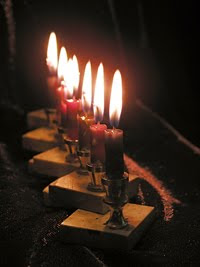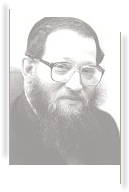In a Shiur by Rebbetzin Kalmonovitz she said that Hashem gets tremendous Nachas from us telling stories of the Tzadikim becuase it inspires us to improve ourselves. Therefore I am posting this from:
http://www.JewishWorldReview.com |
Two reporters, Israel correspondents from international secular publications, called the other day. Each was seeking the "truth" about supposed controversies within the fervently-Orthodox world.
I told both the same thing: Stop wasting your time on fringe groups and trivial issues. If you want to understand the "ultra-Orthodox" community, first find out why over a 100,000 people attended the funeral of Rabbi Nosson Tzvi Finkel, with tens of thousands of adults sobbing openly and unashamedly. If you want to understand a person or a community, observe what he or they honor: "[A] person [reveals himself] according to what he praises" (Proverbs 26:21).
Who was the remarkable man whose passing inspired such grief?
When Rabbi Finkel took over the reins of Jerusalem's Mirrer Yeshiva from his father-in-law, Rabbi Beinish Finkel, zt"l, in 1990, he had already been diagnosed with Parkinson's Disease. Many wondered how he could carry the burden of a yeshiva (rabbinical academy) that numbered 1,000 married and unmarried students. Yet under his leadership the yeshiva expanded rapidly. New buildings were built; another branch was started in a community outside Tel Aviv. One sage quipped that Rabbi Nosson Tzvi might as well put a roof over the entire neighborhood and call it Mirrer Yeshiva. Today, 6,000 students learn in Mirrer Yeshiva's many study halls, making it the largest yeshiva since the closing of the Talmud, perhaps the largest ever.
"Even when I lie down, I can't rest because of the trembling," from Parkinson's Disease, he told one of his brothers-in-law, "so I think of ways to spread Torah." Our Sages say that the Ark carried those who carried it. And so it was with Rabbi Nosson Tzvi. After one long flight to Los Angeles, a crying stewardess told those who came to the airport to meet him, "Promise me you'll never let him do this again. How could you do this to this holy man?" When people accused his brothers-in-law of "shlepping him" on grueling trips, they replied, "We don't shlep him, he shleps us."
He used his debilitating disease to build more Torah and to teach. A rich businessman refused his request for a large donation. "I can't," he said. The sage told him, "I can't either, but I do anyway." He received the donation.
THE SAGE AND THE CEO
Howard Schultz, the founder of Starbucks, was once was brought to see Rabbi Finkel, along with a group of prominent businessman. They had not been told of his Parkinson's, and instinctively averted their eyes when he entered the room. Soon they heard a bang on the table and Rabbi Nosson Tzvi commanding them, "Look at me." "I know you are all busy men," he continued, "so I'll be brief. What is the most important lesson of the Holocaust?"
He proceeded to describe the situation of the Jews arriving in Auschwitz and other death camps, after being packed into cattle cars for days, without water or facilities of any kind, and then being separated from their loved ones. When the lucky ones reached a barracks, they were given one blanket for six people. They could choose to share it or each one could try to grab it for himself. They chose the former. "The greatest lesson of the Holocaust," he concluded, "is the triumph of the human spirit. Now, each of you return to America and share your blanket with five others."
Someone once asked him for advice on how to learn Torah, even amidst afflictions. Rabbi Nosson Tzvi told him that he didn't know: "I learn with great simcha [joy]." He refused to take the strongest medicines to control his disease for fear they would cloud his mind or rob him of his memory. The sage often learned in a freezing room to be able to meet his daily quotas in learning.
When he mounted the podium in Mirrer Yeshiva to give a lecture in the main study hall, he had to hold fast to two shtenders (lecterns) to remain upright and he never knew whether he would be able to control his tongue sufficiently to speak. Once he was thrown by a violent tremor from his position lying on a couch onto the floor, in the middle of learning with a student. Even before he could be helped up, he was asking his study partner to repeat the interpretation he had been offering.
Just as one would not begrudge the money spent to ransom a loved one, he viewed his ordeals as trivial price to pay for teaching and building Torah, and not as self-sacrifice. Everywhere he went, people of all ages rushed to be within his four cubits and witness a soul that had so transcended the limits of the imperfect vessel of his body.
NATTIE, THE CUBS FAN
With love he inspired thousands of young men to reach heights that they never dreamed possible. In Mirrer Yeshiva, under Rabbi Nosson Tzvi, it did not matter where you were from, your family connections, or how high your IQ: Rabbi Nosson Tzvi was prepared to help each student reach his potential. He never forgot that he arrived at Mirrer Yeshiva, a lanky teenager called Nattie from a coed Jewish high school in Chicago, wearing a Cubs hat (though, he quipped, the golf clubs were left behind.) From his days as a young newly wed until he was felled by a sudden heart attack, he made it a practice to establish study sessions with any student who requested one.
A senior sage several decades Rabbi Nosson Tzvi's senior once came to visit him. Despite Rabbi Nosson Tzvi's protests, the older scholar insisted it was incumbent upon him to visit someone who knew 3,000 students by name. "I'm not sure if I know each one by name," Reb Nosson Tzvi said, "but I love each one." All those who entered the Mir found out that it was true.
A ba'al teshuva (one who reclaims his heritage through observance) recently arrived in Mirrer Yeshiva from Ohr Somayach could not find the special penitential prayers in an unfamiliar prayerbook. His humiliation was rising by the second, until Rabbi Nosson Tzvi, who had somehow noticed his discomfiture, came rushing over with a siddur open to the proper page. Such stories are legion: Rabbi Nosson Tzvi checking on young disciples in their sealed rooms during the Gulf War; Rabbi Nosson Tzvi personally taking a lad who fainted in a lecture to a doctor and then insisting that he move into the crowded Finkel home; Rabbi Nosson Tzvi looking for an apartment to rent with a student about to be married; Rabbi Nosson Tzvi, just back from a fundraising trip abroad, crying at the beginning of his Friday Chumash (Bible) class because "I missed you all so much."
Those who were sure the sage would not remember them from years before in the yeshiva were astonished to be greeted as "My Chaim," in a long receiving line, or to be reminded of a difficulty they had posed to the sage a decade earlier. Some sought to avoid imposing on Rabbi Nosson to officiate at their weddings, which entailed him arriving in a wheel chair and being assisted by at least two others to the chuppah. To no avail. Inevitably they would receive a call in the middle of wedding that the Rabbi Nosson was outside and wanted to wish the new couple Mazel Tov. A former student from America begged him not to attend his son's bar mitzvah at the Western Wall. "I missed your wedding fifteen years ago; I'm not missing the bar mitzvah," Rabbi Nosson Tzvi told him.
"Not a blade of grass grows unless an angel strikes it and says, 'Grow," our Sages teach. Rabbi Nosson Tzvi was that angel for tens of thousands of students and dozens of promising young scholars whom he appointed to give classes in Mirrer Yeshiva. But above all, it was his smile, the way he grasped your hand in both of his.
Mendy entered Mirrer Yeshiva after an indifferent career in other rabbinic schools. But Rabbi Nosson Tzvi was always ready to provide another chance. Towards the end of a long five-month winter zman (semester), the sage announced that he would like the unmarried students to commit to studying Talmud 12 hours a day, without any breaks. It never occurred to Mendy that the sage could mean him. A few days later, Mendy was approached and asked why his name was not on the sign-up.
Mendy could not believe that he had noticed the absence of his name among hundreds of names. But when he saw the Rabbi Nosson Tzvi was serious, he too signed up. The first days were very difficult. But after dropping into bed exhausted on the third night of the new regime, Mendy found himself dreaming about the Talmud in his sleep. The next morning he told this surrogate father what had happened. Rabbi Nosson Tzvi started dancing with him spontaneously in the packed study hall.
Now you know why we are weeping.































